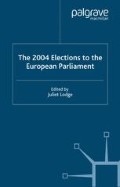The Czech Republic was established on 1 January 1993 after the fall of communism in Central and Eastern Europe and the division of Czechoslovakia. The newly formed state claimed itself heir to the traditions of humanity and democracy of the Czechoslovak Republic founded in 1918. The transition of the centrally planned economy ruled by a communist nomenklatura towards a market economy, multiparty parliamentary democracy and the overall democratisation and resuscitation of civil society went hand in hand with the process of accession to the EU. The dichotomy between transition and EU accession created several frictions, but the EU played an important role as an external factor accelerating the entire process of transformation. The foreign policy of the new democracy was based on the slogan ‘Back to Europe’, signifying the goal of joining Euro-Atlantic structures, especially the EU and NATO.1
Access this chapter
Tax calculation will be finalised at checkout
Purchases are for personal use only
Preview
Unable to display preview. Download preview PDF.
Editor information
Editors and Affiliations
Copyright information
© 2005 Lenka Rovná
About this chapter
Cite this chapter
Rovná, L. (2005). Czech Republic. In: Lodge, J. (eds) The 2004 Elections to the European Parliament. EU Election Studies. Palgrave Macmillan, London. https://doi.org/10.1057/9780230523821_9
Download citation
DOI: https://doi.org/10.1057/9780230523821_9
Publisher Name: Palgrave Macmillan, London
Print ISBN: 978-1-4039-3518-2
Online ISBN: 978-0-230-52382-1
eBook Packages: Palgrave Political & Intern. Studies CollectionPolitical Science and International Studies (R0)

